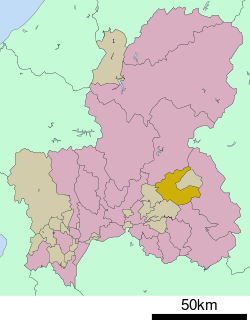Shirakawa, Gifu (town)
| Shirakawa 白川町 | ||
|---|---|---|
| Town | ||
| ||
 Location of Shirakawa in Gifu Prefecture | ||
 Shirakawa Location in Japan | ||
| Coordinates: 35°35′N 137°11′E / 35.583°N 137.183°ECoordinates: 35°35′N 137°11′E / 35.583°N 137.183°E | ||
| Country | Japan | |
| Region | Chūbu | |
| Prefecture | Gifu Prefecture | |
| District | Kamo | |
| Government | ||
| • Mayor | Yoshihiro Imai | |
| Area | ||
| • Total | 237.89 km2 (91.85 sq mi) | |
| Population (July 2011[1]) | ||
| • Total | 9,342 | |
| • Density | 39/km2 (100/sq mi) | |
| Time zone | Japan Standard Time (UTC+9) | |
| City hall address |
Kawamata 715, Shirakawa-chō, Kamo-gun, Gifu-ken 509-1192 | |
| Website |
www | |
Shirakawa (白川町 Shirakawa-chō) is a town located in Kamo District, Gifu Prefecture, Japan.
As of July 2011, the town has an estimated population of 9,342 and the total area is 237.89 km2.
Shirakawa-chou is located in the Chuno region of Gifu Prefecture. Famous primarily for the locally grown green tea, Shirakawa also boasts a maker of Pipe organs, who apparently produced the organ used at McGill University. The town is affiliated with Pistoia, Italy, which is the reason behind the Italian origins of the names of several stores.
Geography
Shirakawa is in the lower reaches of the Japanese Alps. It lies nestled in valleys formed by several rivers, which combine to form the Shirakawa river at one end of the town. The rivers, though substantially developed and altered, remain a source of Ayu, a sweet river fish. The low mountains surrounding the town are heavily forested, primarily with evergreen trees. Japanese macaques, bears, and wild boar are known to live in the local forests.
Transportation
Rail
Sister cities
 Pistoia, Tuscany, Italy (est. October 30, 1994)
Pistoia, Tuscany, Italy (est. October 30, 1994)
References
- ↑ 岐阜県の人口・世帯数人口動態統計調査結果. Gifu prefectural website (in Japanese). Gifu Prefecture. Retrieved September 11, 2011.
External links
 Media related to Shirakawa, Gifu (town) at Wikimedia Commons
Media related to Shirakawa, Gifu (town) at Wikimedia Commons- Shirakawa official website (Japanese)
